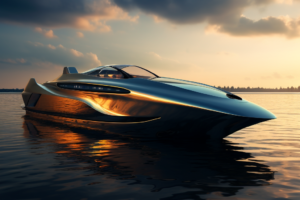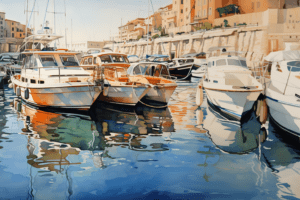Eco Friendly Power Boating Practices in Britain's Inland Waterways
Sustainable power boating practices are becoming increasingly vital in the modern world, particularly in a nation like Britain, with its rich network of inland waterways. Inland power boating offers a unique recreational experience, allowing enthusiasts to explore the stunning British countryside while embracing eco-friendly practices. This article explores sustainable power boating practices within Britain's inland waterways, highlighting ways to minimize environmental impact and promote a more sustainable approach to boating.
Understanding Sustainable Power Boating
Sustainable power boating involves the responsible use of power boats while minimizing harm to the environment. It encompasses various strategies, from utilizing clean and efficient engines to adopting practices that reduce pollution and protect wildlife.
Engine Efficiency and Alternative Fuels:
Opting for fuel-efficient engines and exploring alternative fuels like biodiesel or electric power can significantly reduce the carbon footprint of power boats. Manufacturers are increasingly offering options that prioritize energy efficiency and sustainability. Choosing an
Eco-Friendly Boat can be the major decision you make to truly go sustainable.
Regular Maintenance and Proper Tuning:
Maintaining boats regularly and ensuring they are well-tuned is fundamental to sustainable power boating. Well-maintained engines consume less fuel, emit fewer pollutants, and ultimately contribute to a cleaner, healthier environment.

Eco-Friendly Navigation and Route Planning:
Practicing eco-friendly navigation involves choosing routes that minimize disturbance to wildlife and sensitive habitats. Boaters should steer clear of protected areas, breeding grounds, and shallow waters to avoid causing harm to the ecosystem.
Noise Pollution and Its Mitigation:
Power boats can produce significant noise pollution that disturbs both wildlife and fellow boaters. By investing in quieter engines and adhering to speed limits, boaters can reduce their noise impact and preserve the tranquility of inland waterways.
Waste Management and Recycling:
Responsible waste management is crucial for sustainable power boating. Boaters should carry adequate waste storage containers and dispose of waste in designated facilities onshore, promoting recycling and responsible disposal.
Promoting Sustainable Tourism:
Encouraging sustainable tourism among power boaters is essential. This can involve educating boaters about local ecosystems, wildlife, and responsible boating practices, fostering a sense of environmental stewardship.
Community Involvement and Advocacy:
Boating communities can play a vital role in advocating for sustainable power boating practices. Engaging in local cleanup initiatives, organizing awareness campaigns, and promoting eco-friendly marinas are effective ways to make a collective difference.
Minimizing Coastal Impact:
While focusing on inland waterways, it's important to consider coastal impact as well. Boaters should adhere to coastal conservation guidelines, such as avoiding fragile marine habitats and practicing safe anchoring to preserve underwater ecosystems.
Incorporating Solar Power and Hybrid Systems:
Integrating solar panels or hybrid propulsion systems into boats can harness renewable energy and reduce reliance on traditional fuel sources. These technologies are evolving rapidly, providing exciting prospects for sustainable power boating.
Encouraging Responsible Speed and Wake Management:
Power boaters should maintain responsible speeds to minimize wake that can erode riverbanks and disturb nesting sites. Being considerate of other water users by slowing down in congested areas is also a responsible practice.
Educational Programs and Certifications:
Promoting educational programs and certifications focused on sustainable power boating can equip boaters with the knowledge and skills necessary to navigate responsibly and protect the environment.
Supporting Green Initiatives in Marinas:
Marinas play a crucial role in promoting sustainability. Supporting marinas that implement eco-friendly practices, such as recycling facilities and pollution control measures, helps drive the adoption of sustainable power boating.
Advancements in Hull Design for Fuel Efficiency:
Continuous advancements in hull design are improving the fuel efficiency of power boats. Innovations that reduce drag and enhance hydrodynamics contribute to sustainability by reducing fuel consumption and emissions. The Delphia Range of
eco friendly river boats is a perfect example of how a boats design can
Conclusion: Navigating the Future Responsibly:
Sustainable power boating in Britain's inland waterways holds immense promise for preserving the natural beauty of these water bodies for generations to come. By embracing eco-friendly practices, utilizing cleaner technologies, and fostering a culture of environmental responsibility, power boaters can play a crucial role in ensuring a sustainable and enjoyable boating experience.
In summary, adopting sustainable power boating practices is a collective responsibility that benefits not only the environment but also the future of recreational boating in Britain.



